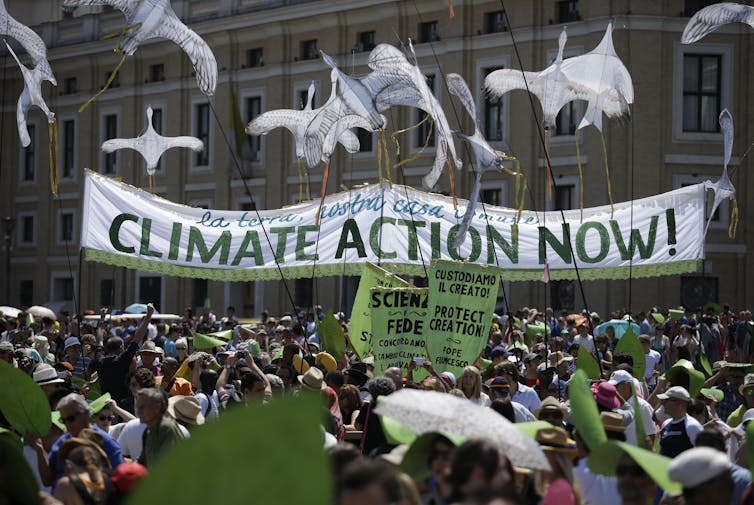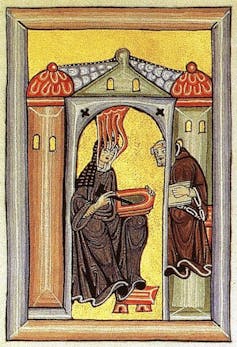Vatican’s conference on climate resilience: 5 essential reads

Molly Jackson, The Conversation
From May 15-17, 2024, American leaders including California Gov. Gavin Newsom and Massachusetts Gov. Maura Healy are attending a global conference on environmental issues. The host? The Vatican.
The summit, “From Climate Crisis to Climate Resilience,” will focus on human adaptation, not just trying to mitigate climate change. “We need to embark on building climate resilience so that people can bend the emissions curve and bounce back from the climate crisis safer, healthier, wealthier to a sustainable world,” the Pontifical Academy of Sciences said in a statement announcing the workshop.
The Catholic Church might seem a surprising institution to convene a climate change event. But many saints, activists and religious leaders have called on their faith to inspire care for the Earth. Pope Francis in particular has been vocal about the risks of climate change, especially its impact on the world’s poorest and most vulnerable people.
Here are five aspects about Francis’ views – and Catholicism’s broader relationship with the environment – that scholars have written about for The Conversation.
1. God’s creation
Care for the Earth has a long Catholic lineage, dating back centuries.

“One of the basic beliefs of Christianity is that the material world was created directly by God, and thus fundamentally connected with God’s goodness,” explained Joanne M. Pierce, a religious studies scholar at College of the Holy Cross.
One saint who took that teaching to heart was Hildegard of Bingen, who died in the 12th century. A German expert on herbal medicines and botany, she was also a writer, and she “espoused a kind of ‘green’ theology, called viriditas.”
Another Catholic saint famous for his love of nature is Francis of Assisi, the patron saint of ecology: an Italian friar described as treating animals “with the same dignity as human beings.”
2. Faith – and reason
In fact, when Pope Francis published an encyclical on the environment in 2015, he took its title from one of his namesake saint’s poems: “Laudato si.”
The encyclical links concern for climate change with Catholic teachings. But it is not just meant for Catholics; Francis also makes science-based arguments that people can appreciate with or without religious faith, noted Lawrence Torcello, a philosopher at the Rochester Institute of Technology.
“Laudato si” is a notable “example of how reason ought to be incorporated into public discourse,” Torcello wrote. In a time as polarized as our own, arguments need to be framed in a way that anyone can understand, even if they don’t agree, “regardless of private religious or parochial commitments.”
3. An influential messenger
Similarly, University of Michigan business scholars Andrew Hoffman and Jenna White zoomed in on the pope’s ability to speak to people beyond divides: Catholics and non-Catholics, Republicans and Democrats, people who care deeply about climate change and others that are skeptical about it.
In the United States, they pointed out, debates over climate change are often more about worldviews than about scientific proof. “Calling on people to protect the global climate because it is sacred … will create far more personal commitment than a government call for action on economic grounds or an activist’s call on environmental grounds,” the pair wrote.
4. Environmental front line
Francis has often highlighted climate change’s unequal impact on people across the globe. That was on display in 2019, when the Vatican hosted a “Synod of the Amazon” – a region especially threatened by environmental destruction.
“As a theologian who studies religious responses to the environmental crisis, I find the pope’s effort to learn from the indigenous people of the Amazon noteworthy,” wrote University of Dayton professor Vincent Miller.
“Some might dismiss this synod as just a meeting,” he acknowledged. But “the Synod of the Amazon marks a significant shift from high-minded papal exhortations about taking climate action to a global religious community that gives voice to those living on the front lines of ecological destruction.”
5. Warnings and wonder
In 2023, Francis released an addendum to “Laudato Si.” Like the original document, it linked environmental, social and technological challenges – such as by rebuking wealthy countries and individualistic attitudes for ignoring climate change’s impact.
In the pope’s eyes, “all life exists in relationships,” wrote Lisa Sideris, an environmental ethicist at UC Santa Barbara: nature, human beings and the divine. “Francis’ social critique, I believe, stems from his vision of life – one filled with awe for the depth of meaning and mystery to be found in an interconnected world.”
Part of the problem, as Francis presents it, is that people have forgotten just how deeply bound together we are – a theme likely to be front and center at this week’s summit.
This story is a roundup of articles from The Conversation’s archives.
Molly Jackson, Religion and Ethics Editor, The Conversation
This article is republished from The Conversation under a Creative Commons license. Read the original article.

